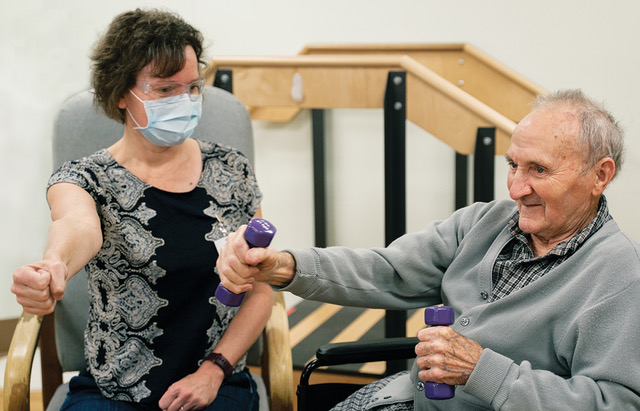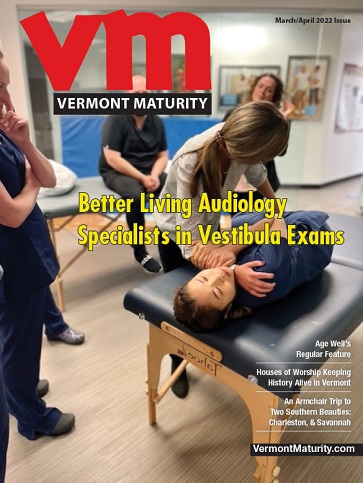
As parents age, often their children are the first line of care. Why? Because parents and children are family, and we are taught that family takes care of family.
At first, caring for an aging parent is relatively simple: dropping in a few times a week, leaving a meal on the counter, driving him or her to pick up groceries and attend appointments. Almost imperceptibly, the level of need increases. Visiting aides are wonderful, as are neighbors and other family members, but their time only allows for limited oversight. As a parent’s aging progresses, doctors discover conditions and complications, and everyone can easily start to feel overwhelmed.
Suddenly, everything becomes too much. Even when an adult child who is providing care isn’t sure what to do next, contemplating a long-term care facility for an aging mother or father can be difficult. But choosing a care community for an aging parent can also be the ultimate act of compassion – for one’s mother or father – as well as for oneself. Sometimes the best way to care for family is to allow others to help.
Oversight of Complex Medical Conditions
As medicine advances, people are living longer with increasingly numerous, and more serious, conditions. Sometimes conditions multiply as other diseases are implicated. The care plan for an aging parent can become complicated and it can feel more and more risky to try to manage his or her health care, even with the assistance of doctors and aides. On the other hand, long-term care facilities have dynamic patient management teams composed of doctors, nurses, nutritionists, and therapists who attend to residents’ changing needs throughout their time there.
Medication Management
Medication is a major element of any care plan. Figuring out what to give, with what, how, and when can result in an extraordinarily complicated matrix. Within a long-term care community residents’ medication management is top of mind to staff, where a support team is trained to work together in a coordinated fashion to spot inconsistencies, new challenges, and changes in an aging parent’s health or condition.
Nutrition
Nutrition is important for everyone, and as we age, our dietary needs change. Sometimes an elderly parent can no longer chew or digest certain foods; sometimes they develop allergies or lose their preference for foods due to disease or medications. Long-term care communities carefully calculate the nutritional needs of residents, establishing a dietary plan that offers balanced, customized meal plans based upon individual needs.
Mobility
Movement is a big part of health at any age, and a foundational piece of care in long-term care communities. Balloon volleyball, resistance training with hand weights, and chair yoga led by qualified professionals are all ways that residents in long-term care communities can stay limber – and have some fun! Activities that encourage mobility are planned by therapists who are familiar with participants’ care plans. In addition, some long-term care communities offer rehabilitation services, which go deeper into the therapeutic needs of a patient who has experienced injury or is recovering from surgery.
Social Stimulation
The brain works in harmony with the body. In addition to exercise, long-term care communities offer seasonal events and holiday celebrations with peers. Sugar-on-snow with maple syrup, tea parties, birthday parties, manicures, crafting, cookouts, and road trips to local farms… These events are planned by staff who focus on creating opportunities to safely build camaraderie, keep residents engaged, help them stay in a routine, and perhaps uncover joyful memories.
Preserving Relationships
We have heard a lot about the “sandwich generation.” Adults who are raising children while taking care of aging parents have little time left to themselves. Even if small children are not in the picture, the relationship between a parent and adult child caregiver can become strained. Caring and responsibility for an aging parent is not only stressful; the parent and adult child can both come to question their roles in the developing end-of-life relationship. Sanitation, hygiene, safety, and disease management are standard in a long-term care community. These services allow parents and their adult children to focus on the positive aspects of their relationship at a time when it matters most – continuing their many rewarding decades of life together.
Choosing a long-term care facility for an aging parent can be a difficult decision, fraught with feelings of inadequacy, anxiety, or guilt. But once a family takes a clear look at the options, the safety and security of a long-term care facility may well offer the best standard of care for an aging parent, as well as his or her caregivers.
Vicky Parra Tebbetts is a freelance writer who loves all things Vermont. She writes on behalf of Mayo Healthcare, a locally owned nonprofit located in Northfield, Vermont, offering residential care, expert rehabilitation, and skilled nursing services. MayoHC.org, 802.485.3161.
Related Articles & Free Vermont Maturity Subscription Sign Up

Long-Term Care Planning For a Healthy Retirement
Protect Your Family from Long-Term Care Costs






Comment here